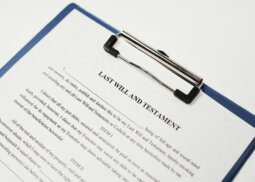
What does a witness do?
The witness is present to verify that the testator, who authored the will, is indeed the one signing it. A will becomes legally binding only when it is signed by the testator and two witnesses. The testator must sign the will in front of two witnesses or confirm to them that the signature on the will is theirs. Subsequently, each witness must also sign the will, providing their name, address, and occupation. Notably, the witnesses are not required to read the will or be aware of its contents.
Why do you need a witness?
The witnesses verify the following:
- The individual who drafted the will is the one who is signing it.
- The signature is authentic and not forged.
- The testator is signing voluntarily and without coercion.
- The testator possesses the mental capacity to comprehend and consent to the contents of the will.
It is crucial to have two impartial witnesses with no personal interest in the will to ensure objectivity; individuals who stand to benefit from the will cannot act as witnesses. Failure to have two independent witnesses would constitute a “lack of due execution,” rendering the will invalid as proper legal procedures have not been adhered to.
What’s the process?
The process is simple. The testator and the two witnesses must sign and date the will while observing each other’s signatures. The witnesses should also include their full name, address, and occupation. Use clear ink for writing, and avoid attaching anything to the will, as this could invalidate it. If you have any questions about the signing procedure, our team is ready to assist you.
What legal responsibilities does a witness have?
Once a witness has signed the will, they typically have no further ongoing legal obligations. The only scenario where they might be involved again is if there is a challenge to the will’s validity after the testator’s death. If someone alleges that the signature was forged or that the testator was coerced or lacked mental capacity at the time of signing, the witness’ testimony could become crucial. They may be requested to sign an affidavit affirming the circumstances surrounding the will’s execution.
Who can be a witness?
A witness must be a disinterested adult who is not related to the testator and holds no personal stake in the Will. An ideal witness could be a neighbour or family friend. However, certain individuals cannot serve as witnesses, including:
- The spouse or civil partner of the testator
- Any beneficiary named in the Will
- The spouse or civil partner of a beneficiary
Executors are permitted to act as witnesses. If you have any confusion regarding the Will signing process or need guidance on selecting a suitable witness, our team is here to assist you.
Should You Ever Refuse to Witness a Will?
You should decline to witness a will if:
- The person signing is not the testator.
- You doubt the mental capacity of the testator.
- You suspect the testator is being coerced into signing the will.
- You are aware that you are a beneficiary named in the will or that you are the spouse or civil partner of a beneficiary.
This list is not exhaustive, and if you feel uneasy about any aspect of the situation, it’s advisable to decline to act as a witness.
Can a beneficiary be a witness?
No, if a beneficiary, or their spouse or civil partner, witnesses a will, they lose their entitlement to their portion of the estate.
Can an executor be a witness?
Certainly, an executor is permitted to act as a witness to a will, provided they are not listed as a beneficiary in the will.
Does the will become invalid if a witness dies?
No, it is possible for a person to create a will long before it takes effect, and it’s entirely feasible that one or both witnesses could pass away before the testator. This does not invalidate the will in any manner.


